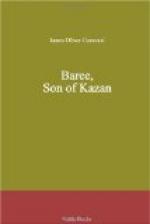In another way the exercise of travel was good for Baree. It gave his wound no opportunity to “set,” as Pierrot would have said, for in reality his hurt was more painful than serious. For the first hundred yards he hobbled along on three legs, and after that he found that he could use his fourth by humoring it a great deal. He followed the creek for a half mile. Whenever a bit of brush touched his wound, he would snap at it viciously, and instead of whimpering when he felt one of the sharp twinges shooting through him, an angry little growl gathered in his throat, and his teeth clicked. Now that he was out of the hole, the effect of the Willow’s shot was stirring every drop of wolf blood in his body. In him there was a growing animosity—a feeling of rage not against any one thing in particular, but against all things. It was not the feeling with which he had fought Papayuchisew, the young owl. On this night the dog in him had disappeared. An accumulation of misfortunes had descended upon him, and out of these misfortunes—and his present hurt—the wolf had risen savage and vengeful.
This was the first time Baree had traveled at night. He was, for the time, unafraid of anything that might creep up on him out of the darkness. The blackest shadows had lost their terror. It was the first big fight between the two natures that were born in him—the wolf and the dog—and the dog was vanquished. Now and then he stopped to lick his wound, and as he licked it he growled, as though for the hurt itself he held a personal antagonism. If Pierrot could have seen and heard, he would have understood very quickly, and he would have said: “Let him die. The club will never take that devil out of him.”
In this humor Baree came, an hour later, out of the heavy timber of the creek bottom into the more open spaces of a small plain that ran along the foot of a ridge. It was in this plain that Oohoomisew hunted. Oohoomisew was a huge snow owl. He was the patriarch among all the owls of Pierrot’s trapping domain. He was so old that he was almost blind, and therefore he never hunted as other owls hunted. He did not hide himself in the black cover of spruce and balsam tops, or float softly through the night, ready in an instant to swoop down upon his prey. His eyesight was so poor that from a spruce top he could not have seen a rabbit at all, and he might have mistaken a fox for a mouse.
So old Oohoomisew, learning wisdom from experience, hunted from ambush. He would squat on the ground, and for hours at a time he would remain there without making a sound and scarcely moving a feather, waiting with the patience of Job for something to eat to come his way. Now and then he had made mistakes. Twice he had mistaken a lynx for a rabbit, and in the second attack he had lost a foot, so that when he slumbered aloft during the day he clung to his perch with one claw. Crippled, nearly blind, and so old that he had long ago lost the tufts of feathers over his ears, he was still a giant in strength, and when he was angry, one could hear the snap of his beak twenty yards away.




